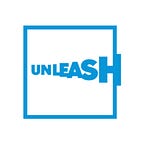Safer Syria and Safer Schools
Two UNLEASH talents in the SDG11 Sustainable Cities track explore ways to impact their home countries of Syria and Uganda with tech solutions
SHENZHEN, CHINA — Alaa Baa was born a twin in Syria 32 years ago. When it was time for him to serve his two years of military service for the Assad-led government, the trained architect and engineer fled. “They said ‘two years,’ but they really meant ‘infinity,’ “ he said over a lunch of rice, bok choy, and watermelon yesterday in Shenzhen. “I have friends that have served eight years of service. War there is endless.”
Now Baa is living in Turkey at the Syrian border, working for an NGO called WATAN to help his home country navigate the chaos. The northern part of Syria, he said, has an infrastructure built to accommodate 100,000 people. There are currently six million people living in the region.
There is no shortage of volunteers and organizations willing to help in Syria, but that is part of the problem, and that is what Baa aims to tackle with his team at UNLEASH 2019, in the SDG11 Sustainable Cities track.
“As a Syrian national who has witnessed more than eight years of severe war and its tragic effect on the basic needs of the Syrian people — such as access to safe housing,” he said, “I feel that it is highly valuable to work on interventions that promote a better response for these populations most affected by war. They were forced to leave their own houses and many now live in camps — or worse — due to continuous war in Syria.”
There are some 800 NGOs operating in Turkey at the border with Syria, but the chaotic nature of the conflict, the ever-present dangers in the region, and the inability of these NGOs to address statistics or even keep up with the rapid boots-on-the-ground changes in the area have left them with data that is obsolete before they even react. Sometimes, this leads to the helpers doing more harm than help.
As an example, Baa noted that an NGO undertook to helpfully vaccinate Syrian livestock. The NGO secured a vaccination for the condition enterotoxemia suffered by sheep, goats, and other four-legged livestock — enough for more than 600,000 animals. But the problem is, Baa said, there were only some 400,000 animals. And because vaccinations require refrigeration if not used quickly, some 200,000 excess vaccinations went to waste. “There was no use for them,” he said. “It was a total waste of money.”
What Baa and his UNLEASH team are aiming to do is to create a database that can organize key data points and metrics for the no-man’s land of northern Syria, which can greatly assist and guide the 800 NGOs operating in the region.
“There is no government there,” he said. “And of the six million living in the region, only half a million are living in camps. Many live in conditions that are worse, like in an abandoned school, an abandoned government building, or just under some trees.”
Baa first heard about UNLEASH through his fiancee, a Syrian refugee who was an UNLEASH talent last year in Singapore. This year, she is back as a facilitator for the SDG4 Education track.
Christine Adero, 28, from Uganda, read about UNLEASH online and took a chance signing up. While Baa’s team is trying to organize efforts to make Syria safer, Adero’s team is attempting to fix a problem affecting the safety of young girls in Uganda.
Girls and women traveling alone in Uganda are subject to, at the very least, disturbing catcalls in the street. Far worse, they are vulnerable to emotional, physical, and sexual violence. So whether in rural or urban areas, getting up before light and getting home after dark can prove to be a difficult gauntlet — not the sort of matter a young girl trying to get an education should have to worry about.
Adero’s team is called Safer Routes for Girls (hashtag: #SaferRoutesforGirls). As a mentor to young girls in her work as Program Manager for Girl Child Network Uganda, a group of girls-empowerment clubs in that country, she listened to what challenges they faced.
“When they told me their experiences,” she said, “I thought of ways to make a change. I did a baseline survey with the girls that I work with, in 15 schools in three districts in Uganda (one in Kampala, and the other two outside the capital). I must say I was shocked with the results. They were mostly negative — more than 50% reported incidents of physical, sexual, and emotional abuse on the way to and from school, and on a daily basis.”
Much of this led her to reflect on her own experiences. “I was exposed to so many risks,” she recalled. “Although I don’t remember being abused, but having to walk by a bar or down a dark road. Sometimes men — on a means of transport we call boda bodas — would make comments, like, ‘You’re ready for marriage’ or ‘You should be my future wife’ “ — or worse. “And then they’d say, ‘And if you say “No,” if you pass by here tomorrow, I will show you.’ ”
The chilling threats made just getting to school safely a difficult challenge, and that is Adero’s challenge at the moment. Her team’s idea is still in workshop mode, but the general idea would be to find a cost-effective safer means of transportation, likely with an Uber-like app that also coordinates boda bodas.
“I have the platform to sit down down with girls,” she said, “and I can affect their lives and have a positive impact on their education.”
